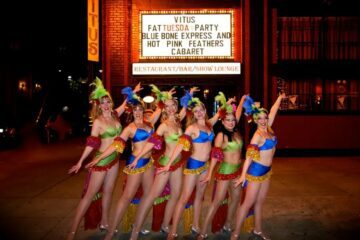A San Franciscan in Paris, On Election Day
By: Lucie Duffort
Sunday night, France pulled through elections that had this bi-national flipping out.

French Presidential Candidates Marine Le Pen & Emmanuel Macron
As the results rolled in, I sat in an apartment at Chateau Rouge, a part of Paris that is full of life but very far from the Champs Elysées and Café Flore. My entourage represented Tunisia, Algeria, Italy, France, the States, and Cameroon. Among the six who could vote, two had proudly abstained, and a third, my friend Geneviève, had watched the polls and waited until the last minute to begrudgingly turn in a ballot, convinced she would regret participating and giving up her values.
If you haven’t seen John Oliver’s explanation of the French elections from mid-April, do. But here’s Sunday’s downlow:
Marine Le Pen, who ran as head of the notoriously nationalist and frankly racist Front National party, faced off against Emmanuel Macron, a 39-year-old centrist investment banker who for a time was economic adviser to the supremely unpopular current president, François Hollande. Macron created his own party, En Marche !, which has to be the first political party name to include an exclamation point.

Image: Voice of Europe
To ridiculously simplify, France had one untested “meh” candidate and another who would be very, very bad for the country, the EU, and quite possibly the world.
Now, I was in France for most of my twenties, but I live in San Francisco now. So naturally November 8th found me in a Castro bar, waiting with my pantsuited friends for an assured Clinton victory. We know how that went down. For me, the bar closed early and I spent months being reassured by an overworked shrink that I was not alone.
So here in France, faced with an astounding number of smart people who said they would abstain, I got riled up.
Because I don’t care if it’s sappy, I love France. The people really do respect art, research, and work-life balance. They are elegant and well-heeled and eat cheese plates on café terraces, sitting around philosophizing and smoking Gauloises until they miss the last metro and have to stumble cobblestone streets home. And I want to keep loving France.

“Bohemian Paris”. Image Life Magazine 1960’s.
Culturally, the country has been changing a lot, and for a long time. Waves of immigrants have come in, bringing new customs and new foods and new considerations. It is more diverse and more divided, with a frightening idea among some that there is Real France and New France. This can lead to dangerous thinking. Especially when you take into account the past years’ terrorist attacks.

The Bataclan concert hall attack in Paris in November 2015. Image: lemonde.fr
Still, even with the resistance to change, the often inflated sense of self-importance, the idea that they should be entitled to exactly the same rights and privileges as their parents and grandparents, France, and Paris in particular, is still full of people who love to think, to debate loudly, and to argue ideology over carafes of cheap and delicious wine.
This was what worried me. Not the wine, the theory. The last time a racist fascist (Le Pen’s father Jean Marie) had made it to the second round, there was unprecedented voter turnout and he lost in a landslide (to Jacques Chirac). But now the precedent was there, and people felt they could sit the election out. Idealists didn’t want to vote for the Lesser Evil. They wanted to pout and cross their arms and demand the other guy, the one who didn’t win the primary.

Jean-Marie Le Pen, devout xenophobe and anti semite
Sound familiar?
In the end, though turnout looked relatively grim late into the afternoon, Macron made it out with 66.1% of the vote, and Le Pen at 33.9%. At 25.3%, abstentions for a second round were the highest they had been since 1969. (As reported by Le Monde at 10:20 May 8th)

That 74.7% participation rate still seem pretty dang good when you consider that voter turnout in the US was at about 55% in 2016, and since 2000 has sat between 51% and 58%.

Voter Turnout in US Presidential Elections: 1828 – 2012. The American Presidency Project: UCSB.edu
Do a little math, and this means that only around half of those eligible voted for Macron. It remains to be seen how much he will be able to get done in parliament with these kinds of numbers, especially when you consider that a large portion of those who voted for him did it because they felt they had to, a point he readily admitted in a somewhat empty and robotic acceptance speech. But he did look pretty up there, just like he generally does, be it in press shots for his party’s website, alongside his 64-year-old wife, or in a spoof cover for a gay magazine.
There was a lot of arguing around our table yesterday. It continued through election coverage and Macron’s lonely and awkward onscreen walk across the Louvre square to claim his victory. It’s entirely possible that this new president is too green to stand up to the challenges that will face him. I hope that he will be well-advised in re-uniting a country whose divisions seem all too familiar. But the realization that France hadn’t made the US’ mistake was the first time I had breathed a sigh of political relief in longer than I can remember.
Our arguing continued long after the results. The Non mais and the Putains and the Arrêtes and the Je regrettes went on into the evening, past coffee, fancy chocolates, homemade digestifs, and rolled cigarettes.
I did miss the last metro, but Geneviève gave me a ride home.








